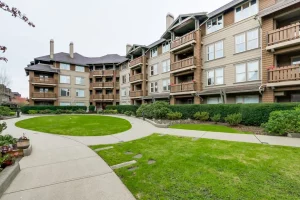Spring has sprung! This means summer is around the corner, and we can enjoy more time outdoors. Swimming is a favourite warm weather activity for many. One of the questions I often get asked is what process must be followed, and what authrisation is required for the installation of swimming pools on exclusive use areas within sectional title schemes.
The answer to this question depends on where the swimming pool will be installed. The consent required and process differs depending on whether the pool is placed on unregulated common property for the benefit of all members; within an exclusive use garden for the benefit of one section; or within a section for the benefit of that owner.
In the next three articles I will discuss the consent levels; legal process to be followed; and other considerations to take into account when installing pools in sectional title schemes. This article will focus on installing pools in exclusive use areas.
Many section owners have exclusive use areas that could include gardens, balconies, rooftop verandas, atriums, stoeps, or patios. These areas may be able to facilitate the installation of a pool, jacuzzi or KolKol wood-fired hot tub.
Neither the Sectional Titles Schemes Management Act 8 of 2011 (the “STSM Act”); nor the prescribed management rules (the “PMRs”) or prescribed conduct rules (the “PCRs”) made thereunder contain any provisions that specifically deal with the granting consent or setting out the process for the installation of swimming pools within exclusive use areas. PMR 30(g) deals with improvements to exclusive use areas. This is the process to be followed for the installation of a swimming pool on an exclusive use area, and states that:
“The body corporate must take all reasonable steps to ensure that a member or any other occupier of a section or exclusive use area does not
(g) construct or place any structure or building improvement on an exclusive use area which in practice constitutes a section or an extension of the boundaries or floor area of a section without complying with the requirements of the Act and the Sectional Titles Act; provided that the body corporate may by ordinary resolution
(i) give consent for such a structure or building improvement, if they are satisfied that it does not require compliance with such requirements;
(ii) prescribe any reasonable condition in regard to the use or appearance of the structure or building improvement; and
(iii) withdraw any consent if the member or other occupier of a section breaches any such condition.
There are also prescribed management rules that could contain relevant considerations and possible restrictions for the installation of pools within exclusive use areas. PMR 30(d) deals with the use of sections and common property, and specifically the structural integrity of the building, and states that:
“The body corporate must take all reasonable steps to ensure that a member or any other occupier of a section or exclusive use area does not make alterations to a section or an exclusive use area that are likely to impair the stability of the building or interfere with the use and enjoyment of other sections, the common property or any exclusive use area.”
If the building cannot support the additional weight that a water-filled swimming pool will add, then the owner should be prohibited from installing the swimming pool. The owner will need to provide an engineer’s report guaranteeing that the swimming pool will not impair the structural integrity of the building.
Another consideration is contained in PMR 30(e) which also deals with the use of sections and common property, and states that:
“The body corporate must take all reasonable steps to ensure that a member or any other occupier of a section or exclusive use area does not do anything to a section or exclusive use area that has a material negative affect on the value or utility of any other section or exclusive use area.”
This provision includes considerations such as whether the swimming pool is likely to prejudice the harmonious appearance of the building; the rights of other owners and occupiers; the ability for other owners to also install swimming pools; access issues for other owners. The trustees should make absolutely sure that they know and take into account all of the possible consequences before consents are given.
Other considerations deal with the causing of nuisance. Swimming does increase noise within the scheme. PMR 30(b) deals with the use of sections and common property, and specifically the causing of nuisance, and states that:
“The body corporate must take all reasonable steps to ensure that a member or any other occupier of a section or exclusive use area does not use a section or exclusive use area so as to cause a nuisance, in breach of section 13(1)(e) of the Act.”
Section 13(1)(e) of the STSM Act reiterates this and states that an owner must not use his or her section or exclusive use area, or permit it to be used, in a manner or for a purpose which may cause a nuisance to any occupier of a section.
PCR 7(1) adds to the nuisance consideration, and states that:
“The owner or occupier of a section must not create noise likely to interfere with the peaceful enjoyment of another section or another person’s peaceful enjoyment of the common property.”
In addition to the additional noise, swimming pools also increase the amount of water and electricity used. It would not be fair for the other owners to subsidise these additional expenses if they are not gaining access to the use of the pool. It is for this reason that I suggest that the body corporate make the installation of a separate water and electricity meters a condition for consent for the installation of the swimming pool. In this regard, PMR 29(3) states that:
“A body corporate must, if so directed by a resolution of members
(a) install and maintain separate meters to measure the supply of electricity, water, gas or the supply of any other service to each member’s sections and exclusive use areas and to the common property; and
(b) recover from members the cost of such supplies to sections and exclusive use areas based on the metered supply.”
The addition of swimming pools certainly adds to the value of the individual section, but can, as shown above, have negative consequences for the other owners. It must be considered whether granting permission is a sensible move, in the particular case and for the scheme generally. In schemes where multiple owners can have individual pools I recommend that the body corporate adopt a conduct rule that specifically sets out:
- How swimming pool applications should be initiated.
- What type of consent is required.
- The process to be followed.
- The installation of separate water and electricity meters.
- The rights and obligations of the owner concerned.
- The times that the pool can be used.
- Provisions that prohibit noise nuisance.
- Possible fining rule for rule infringements relating to use of pool.
Written by Dr. Carryn Melissa Durham of Stratafin













